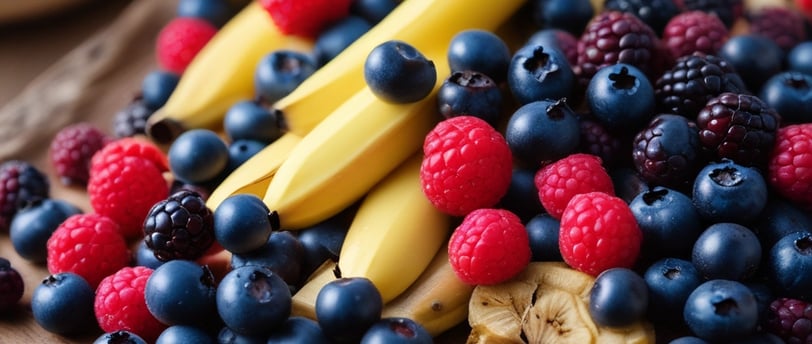Why Organic Produce Matters for You and Your Family
FOOD AS MEDICINE
Monica Rene
2/13/20253 min read


One of the most impactful decisions you can make for your family's health is choosing organic produce. Organic foods, grown without the use of synthetic pesticides, herbicides, or fertilizers, offer a wealth of benefits that extend beyond just the food itself. From improved nutritional content to a reduced exposure to harmful chemicals, organic produce plays a key role in fostering a healthier lifestyle for you and your loved ones.
Health Benefits of Organic Produce
Higher Nutritional Value
Organic produce tends to be more nutrient-dense than conventionally grown alternatives. Studies have shown that organic fruits and vegetables can have higher levels of antioxidants, vitamins, and minerals. Antioxidants, such as vitamin C, carotenoids, and flavonoids, are crucial in helping the body combat oxidative stress and inflammation, leading to long-term health benefits.Fewer Pesticides
One of the most compelling reasons to choose organic is the reduction in pesticide exposure. The conventional farming industry uses a variety of chemical pesticides to protect crops from pests and disease. Unfortunately, some of these chemicals remain on the produce and can be ingested. Organic farming practices prohibit the use of synthetic pesticides, meaning less harmful chemicals make their way into your food—and your body.Better for Your Family’s Health
Choosing organic produce is especially beneficial for children and pregnant women, as they are more susceptible to the harmful effects of pesticides and chemicals. Research has shown that children who eat organic food have lower levels of pesticide residues in their urine, and the fewer chemicals they are exposed to, the healthier their developing bodies will be.Environmental Impact
Organic farming practices focus on sustainability and soil health. By avoiding synthetic fertilizers and pesticides, organic farming helps reduce pollution and protect the ecosystem. Organic farming also prioritizes biodiversity, which helps preserve local wildlife and natural habitats.
Where to Find Organic Produce
Organic produce is becoming more accessible than ever. You can find organic options at most national grocery stores. However, we’ve had the best success finding high-quality organic produce at places like Costco, Fred Meyer, Trader Joe's, Sprouts, and dedicated organic produce stores like Natural Grocers. These retailers often offer a wide selection of organic fruits and vegetables at competitive prices, and some even offer organic-only sections for convenience.
Another great option is Amazon Fresh. They offer a wide selection of organic produce, and you can often find better prices than at your local grocery store. Plus, the convenience of shopping online allows you to filter products based on your preferences—such as organic, grain-free, or even specific brands. If you're interested, you can explore Amazon Fresh here: Amazon Fresh Organic Produce. With the ability to easily sort and filter your grocery list, it's an easy way to access fresh, organic options without breaking the bank.
We also utilize Instacart for our grocery needs. I’ve found it to be a secret weapon that helps me carve out the time to actually cook fresh meals. When you’re short on time, giving up the need to pick out your own produce can free up precious moments to spend quality time with the kids or tackle other tasks on your to-do list. Instacart has become a go-to for us because of its variety of participating grocery stores, making it easy to find organic options. If one store is out of stock, Instacart will show you which stores have it in stock. Here is a link to Instacart if you’d like to give it a try. Of course, there are many other grocery delivery or pickup options available. I strongly recommend utilizing what works best for your family and location.
The Dirty Dozen: Most Important Organic Produce to Choose
If you're looking to prioritize your organic produce purchases, start with the Dirty Dozen. These are the fruits and vegetables that tend to have the highest levels of pesticide residues when grown conventionally. Choosing organic for these items can help reduce your exposure to potentially harmful chemicals.
Here’s the current Dirty Dozen list:
Strawberries
Spinach
Kale, collard greens, and mustard greens
Nectarines
Apples
Grapes
Peaches
Cherries
Pears
Tomatoes
Celery
Potatoes
Focusing on buying organic versions of these items will help you reduce the most pesticide exposure and maximize your health benefits.
Incorporating Organic Produce Into Your Family’s Diet
Making organic produce a regular part of your family's meals doesn't have to be complicated. Start by focusing on the foods that are most important, such as fruits and vegetables that are consumed often. If you’re just getting started, consider prioritizing the Dirty Dozen items for a greater impact.
Also, try to incorporate more plant-based meals into your family’s diet. Smoothies, salads, veggie-based stir-fries, and soups are simple ways to increase your intake of organic produce. By making small, manageable changes, you’ll help your family reap the benefits of healthier, organic food.
Final Thoughts
Choosing organic is an investment in your family's health and well-being. With its higher nutrient content, lower pesticide levels, and positive environmental impact, organic produce is an important step toward a healthier lifestyle. And with the ease of finding organic options through services like Amazon Fresh and Instacart, making the switch is more accessible than ever.
